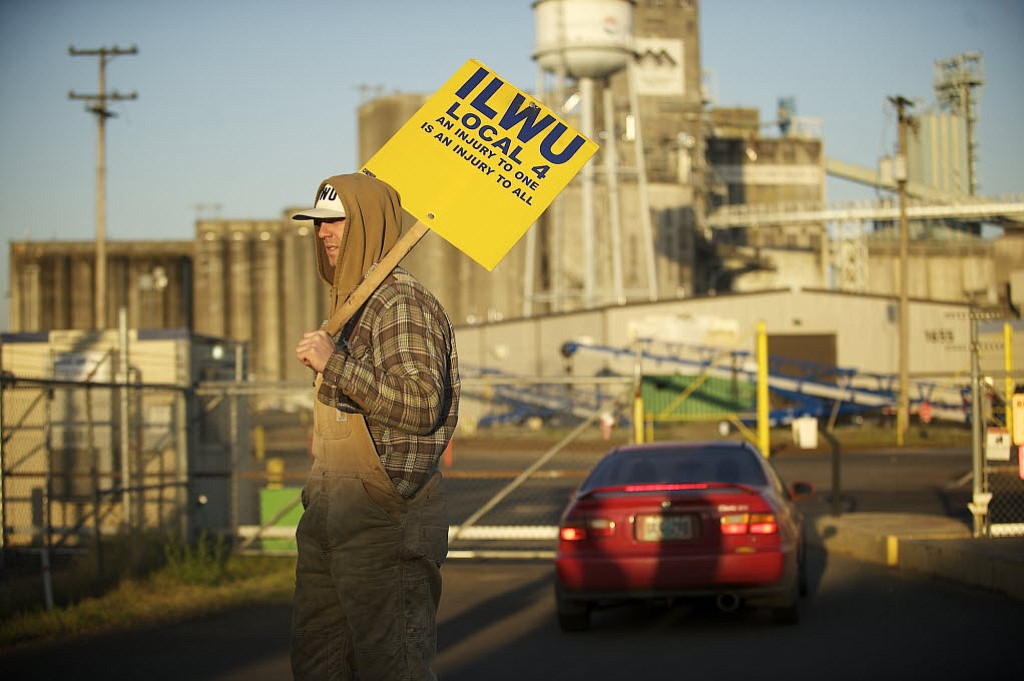Citing neutrality among other reasons, Clark County Sheriff Garry Lucas on Tuesday explained why he declined an offer by United Grain Corp. to pay his office to escort state grain inspectors past picket lines to the company’s facility at the Port of Vancouver.
Lucas, who is out of the office until Aug. 5, outlined his reasons in a letter issued by Undersheriff Joe Dunegan to United Grain, Clark County government officials and The Columbian. The two-page letter delves into police authority, early 19th-century battles between management and labor, and the role of law enforcement.
“My position is that the law enforcement role is a neutral enforcement role that preserves the peace, protects life and property, and protects the rights of the parties as it relates both to the law and the Constitution of the United States,” Lucas wrote in the letter dated Tuesday. “It becomes difficult to maintain neutrality when a police agency is a contractor/employee of one of the parties.”
The letter comes amid a 17-month-long labor dispute between United Grain and the International Longshore and Warehouse Union. It elaborates on a statement issued by the sheriff’s office last week saying it would not provide security escorts for inspectors with the state Department of Agriculture.
Last week’s statement was in response to formal requests by United Grain and the Clark County Board of Commissioners to consider providing security escorts to grain inspectors. Those requests came in the aftermath of a decision by Washington Gov. Jay Inslee to stop using the Washington State Patrol to ferry grain inspectors past picket lines at a gate on the port’s east side.
After the governor’s decision in late June, the state Agriculture department, citing safety concerns, discontinued grain inspections on July 7. Subsequently, United Grain’s operations came to a halt. Although shippers may use other grain terminals in the region, farmers and export groups have raised concerns about their ability to ship products overseas, given the situation at the Port of Vancouver.
In a statement emailed to The Columbian on Tuesday, Pat McCormick, spokesman for the Pacific Northwest Grain Handlers Association — whose membership includes United Grain — said, in part, that “we agree that the sheriff’s department does not have primary jurisdiction over these issues, and we sincerely appreciate their efforts in trying to address any legitimate safety concerns that (state Agriculture department) inspectors might have in relation to (the Longshore union’s) behavior.”
McCormick said the company’s operations remain shut down.
Primary jurisdiction
In his letter, Lucas notes the request for security escorts “came directly from United Grain” and “not from the (state) grain inspectors.” The company “even offered to reimburse the county for costs associated with … performing these escorts.”
In addition to his position that the sheriff’s office must maintain neutrality, Lucas wrote that the city of Vancouver has “primary jurisdiction” in the matter. “We become involved if and when conflict grows to the point that Vancouver Police can no longer deal with it on their own and call for mutual aid.”
The city’s police department has made no such request. “If they should,” Lucas added, “we would be the first logical mutual aid responder.”
Lucas said the sheriff’s office has never — “and as long as I’m the sheriff never will” — provide security escorts “to a private company involved in a labor dispute to transport or escort management staff, subcontractors or third parties onto management’s property. It is my belief that there are private security firms available to provide such a service.”
Lucas also wrote that federal and state laws regulating management-labor relations grew out of “tremendous unrest” in the early part of the 19th century. “The working class felt that they were the victims of terrible working conditions and were the victims of the manufacturing moguls,” according to Lucas. “I won’t go into who was right and who was wrong. The point is that there was no lawful mechanism to resolve differences. The result was violence, bloodshed, and atrocity committed by both sides.”
He went on: “Cronyism was rampant, and those with power and influence convinced the political machine to use the police as a means of controlling those demonstrating against them. Neutrality and a sense of fairness lost.”
As a result, Lucas wrote, there’s “an established framework of law” by which management-labor conflicts may be resolved. He urged United Grain and the Longshore union to “avail themselves of that framework.” However, he wrote, “I will not become the employee of either side.”
‘Ultimate responsibility’
In his statement to The Columbian on Tuesday, McCormick, the spokesman for the Grain Handlers Association, said “we understand and accept that (Gov. Inslee) has the ultimate responsibility to protect Washington state employees, including with police services if necessary, from (Longshore pickets’) inappropriate and sometimes illegal behavior.”
Jennifer Sargent, spokeswoman for the Longshore union, has told The Columbian that state grain inspectors don’t feel safe at the picket lines because of conditions created by United Grain, and that “they are union members themselves who generally do not want to cross picket lines.”
Jaime Smith, a spokeswoman for Inslee, has said the governor authorized the State Patrol escorts last fall in hopes it would give United Grain and the Longshore union time to negotiate an agreement. But eight months of negotiations were unsuccessful, she said, and it was clear the escorts weren’t producing the intended results.
Smith has also said the governor was clear with both United Grain and the Longshore union that the State Patrol services were temporary.




